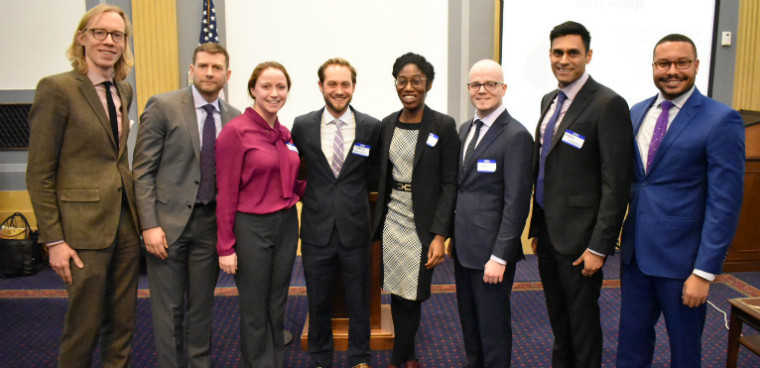New ideas for an old institution
TechCongress is trying to inject technology expertise into the legislative branch.

Travis Moore (fourth from left) and the 2018 class of TechCongress fellows.
Back in 2012, when Travis Moore was legislative director for California Democrat Rep. Henry Waxman, he was having a tough time trying to understand a cybersecurity bill that was generating grassroots opposition among civil libertarians and privacy activists as well as from many big-name internet companies.
The Cyber Intelligence Sharing and Protection Act was an early version of cyber legislation that offered some liability protections to network operators who shared personally identifiabe information with the government as part of the investigative process, with the caveat that information would be anonymized as much as possible.
Moore didn't know anything about PII or data anonymization, and as he went to find answers from fellow staffers, he discovered that no one else on Capitol Hill knew either.
"I made 1,700 vote recommendations for him, and this was by far one of the hardest," Moore said. "I found myself trying to find people in Congress who could explain those concepts and processes to me, and what I found was there weren't people in the building who could do that."
After Waxman retired in 2015, Moore launched TechCongress to try to bring more techies into the building. Moore saw a model for what he wanted in a health policy fellowship program run by the Robert Wood Johnson Foundation. When Moore was tackling a sticky constituent services problem involving a citizen who was falling into gaps in Medicare coverage, there was an expert on hand to help navigate the complexities of the system.
One difference when it comes to tech is that it's not a discrete issue like health care or agriculture.
"You need expertise in house," Moore said. "But there isn't a neat subcommittee jurisdiction that only touches a handful of issues. Tech isn't a slice of the pie -- it's baked into the crust."
A big part of the problem is cultural, Moore said. "Lawyers hire other lawyers. Economists hire other economists," he said.
After running on fumes for about 10 months, Moore lined up funding to cover the first two fellows. Now the program has seven fellows, and Moore hopes to grow to 10-14 fellows for 2019. Fellows receive an $80,000 stipend and some benefits. After an orientation and interview period, fellows are matched with a member or committee office. They are given the opportunity to work for members who share their political outlook and interests. There's no set profile for successful applicants, but most combine formal technology training with an interest in public policy.
Noted privacy expert Christopher Soghoian served as a TechCongress fellow for Sen. Ron Wyden (D-Ore.) before joining the office full time as an in-house technologist. Members of TechCongress' current class can be found working for Sen. Rand Paul (R-Ky.), Sen. Cory Gardner (R-Colo.), Sen. Kristen Gillibrand (D-N.Y.) and Sen. Tom Udall (D-N.M.) among others.
Moore doesn't have plans to try to scale the program to act as a technology advisory service for the legislative branch.
"We don't believe we can solve this problem for Congress," he said. "Congress has to solve the deficit of knowledge about technology itself."
One answer that's been getting some attention lately is reviving the Office of Technology Assessment, an in-house Capitol Hill think tank that was dissolved in the mid-1990s amid concerns about cost and sprawl. A bid to bring back the OTA recently failed in Congress.
"We're not trying to replicate OTA. We serve different needs, but having a support agency is clearly very important as well," he said.
Applications for the next class of fellows are due Sept. 9.






